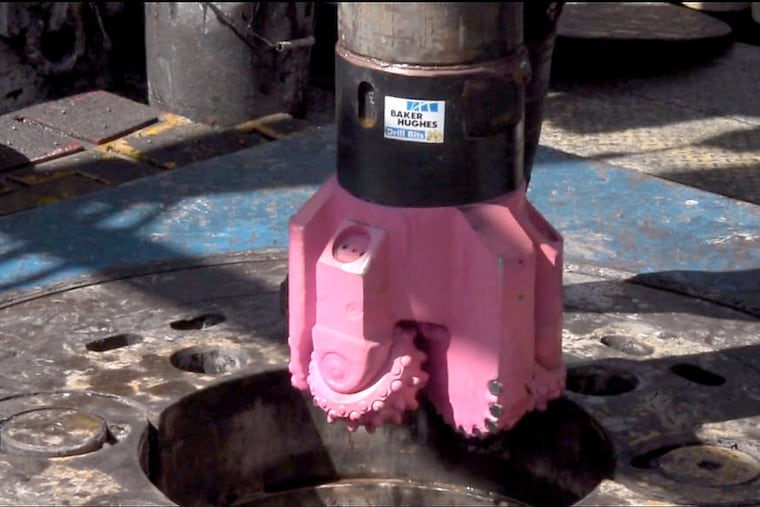GreenSpace: Firm's drill-bit stunt stirs up all-out pink stink
Just when you were sure the world couldn't possibly get any pinker during Breast Cancer Awareness Month, here's the latest: a Texas company that is a leading provider of gas and oil-field services is painting 1,000 of its drill bits that signature shade of pink and sending them worldwide.

Just when you were sure the world couldn't possibly get any pinker during Breast Cancer Awareness Month, here's the latest: a Texas company that is a leading provider of gas and oil-field services is painting 1,000 of its drill bits that signature shade of pink and sending them worldwide.
The bits - bigger than a gallon paint bucket - will arrive in pink boxes with informational pamphlets.
The company, Baker Hughes Inc., also will give the Susan G. Komen breast cancer foundation a $100,000 check at the NFL's final "pink-out" game Oct. 26 in Pittsburgh.
Jeanne Rizzo, president of the nonprofit Breast Cancer Fund, is all but reaching for the pink Pepto Bismol.
She figured she had ceased being amazed "by the willingness of companies to market themselves through this tragic disease."
Indeed, she originally thought the campaign, "Doing Our Bit for the Cure," was a joke. "I'm thinking it can't be true," she said. "It can't be that bad."
Her organization, which advocates for moving "Beyond Pink" - they consider the awareness battle already won - and toward a focus on environmental causes and prevention, has called the campaign "perverse."
True, the backlash against all the October pink-washing has been unrelenting in recent years. Even the pink-bashers are growing weary of it.
And the company actually sent out 500 pink drill bits last October, as well. Maybe no one noticed. But this year's announcement sparked an all-out pink stink.
Once the critics got over their disbelief, that is. Similar to Rizzo, some thought the campaign was a spoof dreamed up by the satirical news organization the Onion.
The Twittersphere lit up, in numerous languages:
How can this nonsense be real?
Beyond irony.
Pink drill bits for the cure. You can't make this stuff up.
Breast Cancer Action, another national nonprofit that has a "Think Before You Pink" campaign, called the bit-pinking the most "egregious" example of pink-washing yet.
"Benzene and formaldehyde for the cure," the organization mocked, referring to two of the chemicals often in solutions used to frack natural gas wells.
(A technicality: fracking comes after the drilling.)
Anti-fracking activist, scientist and cancer survivor Sandra Steingraber saw a Facebook posting about the campaign Tuesday evening, and her outrage kept her up all night, writing a piece for the environmental news website EcoWatch.
"It really brought two parts of my life together - my current work on fracking, and my previous work on cancer-causing chemicals," she said.
In the piece, Steingraber, a distinguished scholar in residence at Ithaca College in New York, castigates both Komen and the company. "It's time to stop taking money from the frackers," she said, conflating Baker Hughes with the companies that use its bits. And, "if the company was serious about combating cancer instead of painting drill bits and creating conduits through which carcinogens flow, it would stop fracking."
Scoffing at the apparently limited audience the pink drills will reach, she wrote, "Here's what I'm wagering that roughneck does not learn from the literature shipped with his drill bit this October. I'm betting he does not read about the recent study from the U.S. Centers for Disease Control that found dangerous levels of benzene in the urine of workers in the unconventional [aka fracking] oil and gas industry."
Benzene is "modestly" associated with breast cancer in women, she wrote, "but the best evidence we have for the benzene-breast-cancer link comes from studies of young male workers exposed to the chemical on the job. Male breast cancer is clearly linked to occupational exposure to benzene.
"So, maybe those pamphlets really will come in handy in the man camps."
On Wednesday, she was talking to reporters, yet hoping each phone call would bring instead the results of her latest lab work. Diagnosed with bladder cancer at 20, she's now 55, but "it just kind of never ends when you're diagnosed with cancer. Your life is on a new path."
Wednesday night, EcoWatch started an online petition with a letter to Komen founder Nancy Brinker: "Fracking is a toxic process - at least 25 percent of the more than 700 chemicals used in fracking are linked to cancer. By taking money from these companies and giving them permission to use your name, you are complicit in a practice that endangers women's health."
By midday Thursday, it had received more than 650 signatures and more than 1.3 million "shares."
Komen, which since its founding in 1982 has invested more than $2.2 billion in research and outreach, did not respond to requests for comment. A spokeswoman for Baker Hughes said she could not comment.
Perhaps what distresses Rizzo most is that it's tough to cut through the hype and drill-bit distraction to have substantive discussion about breast cancer.
"What people should be talking about is we still have a quarter-million people who get a breast cancer diagnosis every year," she said. "And 40,000 a year will die." She wants the research community to look more "at what is causing this and sustaining this level of breast cancer incidence."